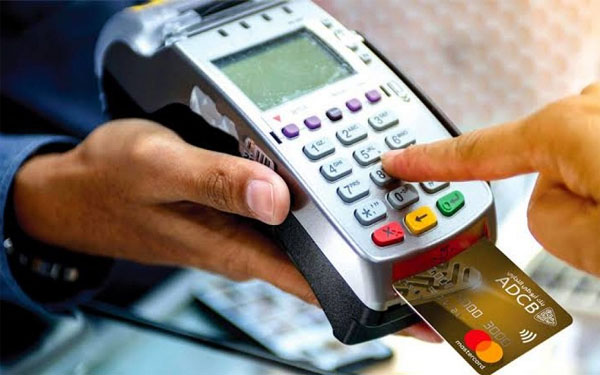
Tomiwa Arobatele, a Point of Sale attendant, is going through a horrific period.
Arobatele has yet to come to terms with the fate that befell her after falling victim to criminally-minded customers. The lady said she recently lost N140,000 to some customers who came to make a withdrawal and credited her boss’ account using a fake alert. The slim-light-skinned young lady said she was currently using her salary to pay back the debt she incurred after the incident.
According to her, her hope of earning N40,000 monthly has been dashed by the incident after searching for a job for about four months to raise money to further her education.
She said, “After my secondary school, I have been trying to get into a higher institution but my parents are unable to afford to finance me. The last admission I secured, my parents were unable to raise enough money before the closing day and that was how I lost the admission.
“I engaged in many menial jobs including working as a factory worker. I also worked in poultry but it was too stressful for me. When I got a job as a PoS attendant, I was excited that the pay would help me to attain my academic goals.
She continued, “My boss warned me not to give anyone money before receiving a credit alert. What she didn’t tell me however was that I could get a credit alert and still not get money in the account. Fake bank alerts are real.
“I was in the shop when three friends walked in and told me they wanted cash. When I heard the amount they needed, I was excited because of the charges on it for my boss. I brought out the PoS. I gave them the account to credit and they made a transfer. I waited a bit and they got debited while our account was credited. I gave them the amount they credited; they paid the charges on it and left.”
Arobatele said reality dawned on her a few hours later when the money didn’t reflect in the account when she checked the balance.
She said, “It was when I screamed that the people in the neighbourhood came and told me that I probably had fallen victim to a fake alert. They sympathised with me and that was where it ended. When I told my boss, she felt sorry but told me that I would have to refund her. She has been deducting N15, 000 from my money monthly.’’
The lady added that it was also painful that she couldn’t recognise them, noting that she always placed curses on them every day for the situation they put her in.
Harvest of losses
A fake bank alert also known as alert flashing involves using a short message service that mimics a bank’s transaction alert to fleece an unwary victim.
It was a similar incident for another PoS operator, Mrs Bose Agatha, as some customers, who used a fake credit alert, swindled her mum and sister.
She said, “I was sad to discover the loss I suffered.’’ She said she was in church between 9 and 10 am that day when the incident happened.
Agatha stated, “They came to the shop disguised as workers working in a site behind our house unknown to them that they were thieves. They perfected their plan to the extent that they even wore clothes of people working in a construction site to deceive them that they were working on the site. They requested withdrawal of N30, 000 and did a transfer. My sister called me to inform me that a transfer of N30, 000 had been made to my account but I told her I had yet to receive the transfer. I also checked my mobile app and found out that it was the same. I told her not to give them the money yet but I overheard them mounting pressure on my mum and sister.’’
Agatha added that her sister and mum could no longer bear the pressure as the swindlers told them that the bank had debited them.
“The pressure became much after they showed them a fake debit alert which conformed with every necessary detail. They gave in to the pressure and gave them the money,’’ she said.
She further said that she thought she would receive the money on getting home, adding that when she didn’t get the money, she concluded immediately that she had been duped by the purported customers.
She stated, “When I got home, I already observed the way the issue was and I had yet received the money in my account. I waited till the end of the day and it was still the same thing. They fleeced us and even dropped an android phone as collateral. The phone was also a useless piece of item.’’
Agatha said though she struggled to move on, she noted that her business had yet to recover from the blow and she was still trying to pay back the debt she owed.
She said, “The money I transacted with was a loan from the firm that owns the PoS. I am paying the loan and now I have to refund N30, 000 to make. It’s taking extra effort to run the business because of some people’s wickedness.’’
Fake credit alerts, one of the growing ways fraudsters now use to dupe business owners, have become a menace in many parts of the country. For established and budding entrepreneurs, the phenomenon is proving to be a threat posing a danger to their investments. Many PoS operators have become victims of the act in recent times.
Mr Sayo Jimoh is another PoS operator who suffered at the hands of those using fake credit alerts to defraud people. He told our correspondent that he had been swindled by them many times.
He noted that the events had taught him not to release money for anyone making withdrawals until he confirmed transfers in his account no matter how impatient the customer was.
He said, “In the last incident I lost N10, 000. The customer told me he was in a hurry. He showed me the debit on his account and I gave him the money since I had been credited. He left hurriedly.’’
Jimoh noted that while he thought all was well, he later realised that he had been duped. He noted that it was the last incident that made him cautious. The father of two told our correspondent that throughout that day the money didn’t reflect in his account.
“I found out later that something was wrong with the credit alert I received. Since then, I decided to always confirm payment in my account before parting with money,’’ he said.
Another PoS operator, Mrs Mariam Sanusi, has also been swindled through fake credit alerts.
She explained that she suffered scams on a number of occasions via fake credit alerts despite not making much profit from the business.
The mother of two said in one of the incidents it was her child who fell victim to their antics while at the shop to help her.
She narrated, “The first one happened about two months ago. I wasn’t around and my son was in the shop. A customer came and he attended to him. The customer was given N20, 400 and transferred the money to our account as they claimed. I had warned them never to give anyone money without receiving a credit alert. He gave the man the money after he received the alert. My name and every other detail showed on the alert, so he gave him the money. It was when I got home that I found out that the money didn’t reflect in my account and the so-called alert was faked.’’
Sanusi noted that she was pained particularly because she didn’t even make as much profit as N20, 000 in a day.
She stated, “I warned both my children and my sales attendant to check with me to ensure that I have received any money in my account before giving any customer who wants to withdraw money.
Sanusi said she thought she had seen it all until last Friday when a customer who drove a fancy car came to her shop to withdraw some money.
She narrated that she attended to the customer herself, adding that he withdrew N97, 000. She added, “I received a credit alert and the money immediately reflected in my account.’’
Sanusi noted that after waiting for some time without receiving the money she went to her bank to seek explanation and was told that there was an embargo on the transaction because it was dubiously done.
“I was confused and shocked at the same time. I asked myself how I would know if a customer was dubious or genuine. Was I supposed to ask for an Identification card in that regard? The bank is still holding onto my money and denied me access to make use of it. I obviously cannot let go of N97, 000 like that. How much profit do I make in a year,” she asked rhetorically.
Other merchants not left out
Some arrests have been made in the past that do not seem to curb the acts which fester like a bad sore.
Azeez Bakare, like others, was also duped using a fake credit alert on August 2, 2018. Since he encountered a fraudster while selling mobile phones, life has taught him a hard lesson. The Osun State indigene, who plied his trade at the popular Computer Village, said the incident marked the beginning of a new meaning of life for him.
He told Sunday PUNCH, “Right now, I don’t know if I want to continue the business or not. The experience really left me unhappy and afraid of people. I find it hard now to trust anyone when I’m transacting a business because I fear that they could do worse things than I had experienced.’’
On the day of the incident, Bakare said the customer who later turned out to be a fraudster ordered four sophisticated iPhones after seeing his advertisement on Instagram; a popular social media platform.
Bakare rushed excitedly to deliver the items at Abule Oja, a community in Akoka, Lagos, at about 6pm – less than an hour after receiving the order. It was not the first time he was responding to such calls, so he had no reason to worry. But about 30 minutes after arriving at the place and the business deal supposedly sealed, Bakare realised that he had been lured into a trap – one that has not only affected his relationship with suppliers but also others as well.
He said, “Ordinarily, I don’t go to deliver orders myself or attend to such at that time of the day but because of the way the guy spoke to me, I had to take the pains to go from Ikeja to Akoka despite the heavy traffic on that axis.
“I went because I thought he was a genuine customer; I never knew that it was someone that had plotted evil for me.
“The guy bought three iPhone 8 Plus and one iPhone X. Each used iPhone 8 Plus costs N235, 000 while the brand new iPhone X was sold at N325, 000.
“When I met him, he took me to the front of an apartment he claimed was his, but I didn’t know that he gave me a fake name and home address as well. After delivering the phones to him and he inspected them, he requested my bank account details so that he could transfer the money into it. Right in front of me, he paid the money into my account and the app even showed my name and bank details as if it was real. He also received a debit alert on his phone.
“Meanwhile, a day before that, I had problems with my SMS notification. Someone transferred money to me in the afternoon but I got the alert at night. So, I thought it was the same situation after waiting for like 20 minutes and not receiving it on my phone.
“Later, one of his friends came and began shouting at him to put on the generator. He pleaded with me to wait for him to quickly do that but unknown to me; the two of them had escaped through the back of the building. After waiting for more than 30 minutes, I called his number to find out what happened. As soon as he heard my voice, he ended the call. When I used another person’s phone to call him, he answered but ended the call when he realised that I was the one. Soon, he switched off his phone.’’
Bakare said he was confused and arrived at his bank early the next day to confirm his fears. But unfortunately, he had just started to experience his worst nightmare.
He said, “The next day, I went to my bank to confirm if the money had entered my account but I was told that there was no such transaction on my account. I felt like disappearing when they told me that.
“I went back to that same house in Akoka to see if I could find the guy but I didn’t. However, one guy was arrested by the police at the place after I reported the matter at the Sabo Police Station. With that and the help of Truecaller app that revealed the culprit’s real name and photograph, the police were able to trace his parents’ house to Ifo in Ogun State.
“Idowu’s father was arrested and asked to produce him. He was later granted bail and showed up with his son and a lawyer at the station a few days later. After negotiations back and forth, the money was eventually paid to me in full on Monday, September 3, same year.”
But while Bakare can at least take solace in the fact that his money was recovered after one month of heartbreak and rigorous pursuit, many of the victims are usually unable to trace the perpetrators of such evil, leaving them in a prolonged state of terror and suspecting of anyone who comes to transact with them. Like they say, once bitten twice shy, no one wants to fall victim to the same incident repeatedly.
Alleged fraudster shares modus operandi
Some of these fraudsters at different times have been caught, arrested and prosecuted in different states such as Akwa Ibom, Oyo and Lagos states.
Men of the Akwa Ibom State Police Command arrested two suspected fraudsters, Emeka Akuma and Moses Asuquo, over fake bank alerts.
The spokesperson for the police in the state, Odiko Macdon, said Akuma was arrested with a Lexus 330 car in Uyo, Akwa Ibom State, on January 18, after buying the car with a fake bank alert. The second suspect, Asuquo, was reportedly apprehended on January 17, while attempting to use a fake bank alert to defraud two people of N200,000.
The police said, “The Akwa Ibom State Police Command on January 18, 2021, relying on credible information that a Lexus 330 saloon car was bought with a fake bank alert at FESTAC Town, Lagos State, trailed the said car to Uyo via Abia State.
“In a coordinated operation, utilising the instruments of intelligence-driven policing by the anti-cultism unit of the command, we arrested one Emeka Akuma of Abia State, along IBB Road by Ibom Hall, driving the car with a fake number plate, Lagos AKD 230 GQ, and recovered the said vehicle.
“On January 17, 2021, operatives of the same unit apprehended a PoS operator, Moses Asuquo, aged 26, for fraudulently using a fake alert to defraud one Markson Wisdom and Edidiong Robert of the sum of N200, 000 at a PoS stand at Udoudoma Avenue, Uyo.”
In Oyo State, one Olumide Olajide, was arrested for allegedly defrauding traders in Ibadan with fake bank alerts.
Olajide, who claimed to be an actor, was among those paraded at the state police command headquarters, Eleyele, Ibadan.
Olajide, alongside his partner, Wemimo Adeyanju, a Higher National Diploma student of Purchasing and Supply at a polytechnic in the South-West, said during an interview that he was arrested in the Apete area of Ibadan.
Asked to explain how he used to generate the fake bank alerts, Olajide said he would ask for the account numbers and names of the sellers after buying goods from them.
After this, he would use the information to generate their details by dialling his bank’s USSD code. After generating the recipient’s name, he said he would alter the old bank alert sent to him by his bank and change the date, amount, and resend the same to the recipient.
According to him, the fake alert sent will show on the recipient’s phone as a genuine alert from his bank.
He said, “I did it just three times before I was arrested. After seeing the alert, they would allow me to go away with the goods paid for with the fake bank alert.”
Adeyanju said he returned to the shop of one of his old victims when he was apprehended.
“I went to another shop and a woman recognised me through the display photograph on my WhatsApp and raised the alarm,” he said.
There should be a strict law agains fraudsters – Security experts
An Information Technology expert, Mr Jimi Awe, said that fake bank alerts were generated when there was an alteration in the Short Messaging System and such messages manipulated by the perpetrators.
He said, “Fake bank alerts are generated by people manipulating the SMS and telecommunications system, who are hackers that have access to people’s databases using certain tools (that I mention for security purposes) to generate such SMS.”
Awe explained that in most cases, those actions were usually premeditated, noting that the perpetrators would have been scouting or snooping around searching for information about their victims.
He explained, “There is an IT term known as social engineering. The actors would have been checking around for information. They could have got certain information about the victim which will help them in their escapades on unsuspecting victims.
“In some cases, they could have even called to get one’s account number as a customer without one knowing. That would give them enough time to carry out their evil plans.”
Awe said that one of the ways business owners could beat the criminals to their game was to double-check whenever they received alerts, adding that it was also important for banks to sensitise traders who bank with them.
He noted, “It is often advised to people to check their balances to note if there is an increase. Traders are advised to check and double-check. They should have more than one means of double-checking their account balances before they receive money.
“It’s quite difficult to track them in cyberspace because they work outside the cyberspace. What we can do is to sensitise the traders to be extra vigilant. And when a person falls victim to such, they should ensure that such an incident is reported to the police, so that it can be investigated. If they don’t report, there is no way the cyber crime security agencies would be aware.
“When the case is investigated, they would find out what system they are using because it’s almost certain that they wouldn’t all be using the same system.”
The ICT expert noted that after investigating the case, the system would be blocked.
He added, “For instance, if they are getting their information banking system, they would be able to know. Also, the responsibility also falls on the banks to educate the traders on how to spot the fake bank alerts and what to do when they see such.”
Also, a security analyst, Dickson Osajie, explained that the emerging threat of banking electronic fraud known as ‘Alert Flashing’ or likely called ‘fake bank alert’ is a terrible concern to bank customers.
He said, “This is a financial terrorism and must be seen as a threat against the society by the government. This financial trick involves the application of SMS messages to misrepresent a successful transaction alert from a perceived bank to defraud unsuspecting persons.”
Osajie explained that in this age of technology, credit alert was no longer a confirmation of payment of goods and services, adding that people must seek other means to verify payments.
He added, “The mitigation factors to this alert flashing trend is to go to the next level of prevention mechanism by first of all calling your account manager for him or her to confirm if payment was received in your account before you can release any purchased goods. Remember that it is your property until payment is confirmed
“Second, if you don’t have any account officer, call your bank manager, operations officer or the customer service department and give your true identity to verify if you are the true owner of the account and discuss your request or worries to verify a credit to your account. “
The security expert also said that banks were also faced with everyday threat, stating that their countermeasure mechanism was to protect themselves from cyber attacks everyday.
He added, “Fraudsters are consistently looking for new methods and technological devices to continue defrauding individuals and institutions of their hard-earned money. One of the best ways bank customers can eliminate the issue of fake bank alerts or alert flashing is by visiting Google play store and downloading their various bank mobile applications and registering their details.
“They can also validate evidence of any payment that’s reportedly made by suspecting a criminal client or a true client in the bank app. They can also visit the nearest ATM to check their account balance before allowing the customer to depart with the goods.”
Osajie noted that urging sellers to ‘act quick’ was another trick fraudsters use to alert traders without knowing it, advising traders not to be in a hurry to let them go with goods without payment proof.
He said, “The detrimental aspect of this fake bank alert verification in business is that it would affect the swift exchange of goods and services without cash. But the customer must be told to be patient during verification
“Business owners must not be scared about losing a client that is impatient because criminals will pretend to be in a hurry. Please don’t be intimidated by their rush, calm down, let them know it’s your business policy. It is better to lose an impatient client than to lose money or goods.
“Finally, the Central Bank of Nigeria must synergise with the Administration of Criminal Justice System and the anti-cyber crime agencies to project stringent punishment for fake bank alert criminals.”
Osajie recommended that there should be heavy sanctions to reduce crime. He said, “The crime consequence and punishment must be heavier than the offence. I recommend a minimum of 12 years imprisonment to be passed into law. This would mitigate the spate of alert flashing.”
On his part, another security expert and criminologist, Williams Ekposon, said there were several ways to approach the issue of fake bank alerts.
He said, “First, this has to do with the policy issue within the banking sector and within the confines of the constitution in the second republic. Fake alerts are programmed, written and released through conspiracy and to defraud people.
“I recall that some synchronised people’s accounts and transferred a minute amount of money into fraudsters’ account which they later used to either buy things online and one would find it difficult to trace the beneficiaries’ accounts.
“This has to do with the ethical conduct of the practice within the banking sector and ICT. That is why I said we have to tackle the policy issue, by drafting a law that prohibits this and the penalty has to be stiff.”
Ekposon noted that orientation also mattered, urging public sensitisation to tackle the issue.
He stated, “They need to be given proper orientation on fake alerts and an implementation channel or office that whenever it happens can be reported to and prompt action taken to address the issue on time.
“People should report when this happens. But right now in Nigeria, do we have an office that is channelled to do such apart from the banking sector?’’
***
Source: The PUNCH
You may be interested

WAFU B U-17 Girls Cup: Ghana Edge Gallant Flamingos On Penalties In Final
Webby - December 22, 2024Despite a spirited performance Nigeria’s Flamingos lost on penalties to hosts Ghana on penalty shootout in the final of the…

Bournemouth Equal Burnley’s Old Trafford Feat After 3-0 Win Vs United
Webby - December 22, 2024Bournemouth’s 3-0 win against Manchester United on Sunday meant the Cherries equaled Burnley’s feat at Old Trafford.United went into the…

Vitolo Announces Retirement From Football
Webby - December 22, 2024Former Spain forward Vitolo has announced his retirement from football.The former Atletico Madrid, Las Palmas and Sevilla confirmed his retirement…


















![American Pastor, David Wilson Seen Eating The Box Of Woman Who Isn’t His Wife [Video]](https://onlinenigeria.com/wp-content/uploads/2019/10/american-pastor-david-wilson-seen-eating-the-box-of-woman-who-isnt-his-wife-video-150x150.jpg)








